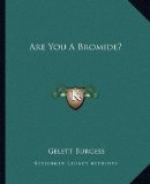XLIV.
“If you could only write stories the way you tell them, you’d make your fortune as an author.”
XLV.
“Nothing can stop a cold, unless you take it right at the start.”
XLVI.
“He’s told that lie so often that he believes it himself, now.”
XLVII.
“If you stay here a year you’ll never want to go back.”
XLVIII.
“Don’t worry; that won’t help matters any.”
* * * * *
Sulphites are agreed upon most of the basic facts of life, and this common understanding makes it possible for them to eliminate the obvious from their conversation. They have found, for instance, that green is restful to the eyes, and the fact goes without saying, in a hint, in a mere word. They are aware that heat is more disagreeable when accompanied by a high degree of humidity, and do not put forth this axiom as a sensational discovery. They have noticed the coincidences known as mental telepathy usual in correspondence, and have long ceased to be more than mildly amused at the occurrence of the phenomenon. They do not speak in awe-struck voices of supernatural apparitions, for of all fiction the ghost story is most apt to be bromidic, nor do they expect others to be impressed by their strange dreams any more than with their pathological symptoms. Hypnotism, they are convinced, has attained the standing of a science whose rationale is pretty well understood and established, and the subject is no longer an affording subject for anecdote. Sulphites can even listen to tales of Oriental magic, miraculously-growing trees, disappearing boys and what-not, without suggesting that the audience was mesmerized. Above all, the Sulphite recognizes as a principle that, if a story is really funny, it is probably untrue, and he does not seek to give an adjuvant relish to it, by dilating with verisimilitude upon the authenticity of the facts in the case. But your Bromide is impressive and asserts, “I knew the man that died!” The Sulphite, too, has little need for euphemisms. He can speak of birth and death without metaphor.
But to the Bromide all such matters of fact and fancy are perpetually picturesque, and, a discoverer, he leaps up and shouts out enthusiastically that two and two are four, and defends his statement with eloquent logic. Each scene, each incident has its magic spell—like the little woolly toy lamb, he presses the fact, and “ba—ba” the appropriate sentiment comes forth. Does he have, back in the shadows of his mind, perhaps, the ghost of a perception that the thing has been said before? Who can tell! But, if he does, his vanity exorcises the spirit. Bromides seldom listen to one another; they are content with talk for talk’s sake, and so escape all chance of education. It is this fact, most likely, which has endowed the bromidiom with immortality. Never heard, it seems always new, appropriate, clever.




